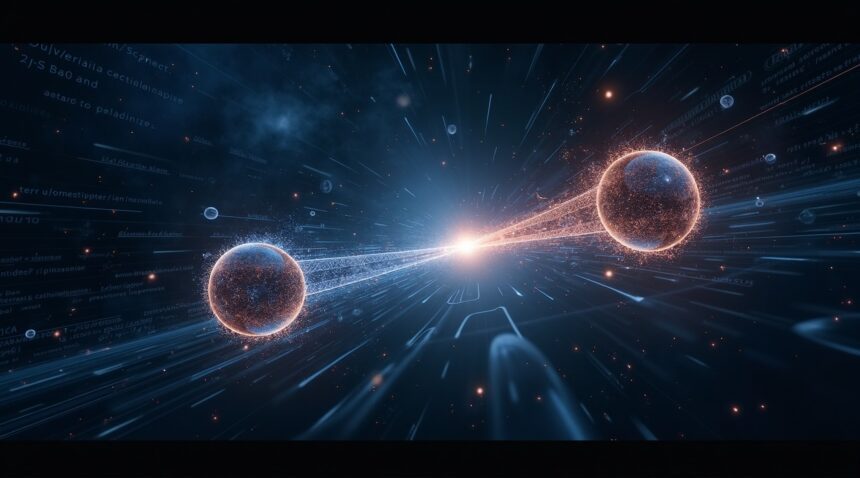Recent advancements in quantum physics have provided compelling evidence that genuine randomness exists in nature, contradicting long-held deterministic views such as Einstein’s assertion that “God does not play dice” with the universe.
Key Takeaways
- Quantum experiments prove true randomness exists – Bell tests involving entangled particles have consistently produced outcomes that cannot be explained or predicted, even with full knowledge of initial parameters. This strongly supports the idea that randomness is an intrinsic part of quantum systems.
- Classical “randomness” is actually predictable – Events like dice rolls or outcomes from standard computer algorithms are governed by deterministic laws. If all variables are known, such events are theoretically predictable, unlike truly random quantum events.
- Quantum random number generators revolutionize security – Leveraging the principles of quantum indeterminacy, these devices generate unpredictable sequences used in secure communications. They are increasingly vital in areas like lottery systems, scientific trials, and fair democratic processes. To explore more, see this Wikipedia article on Quantum Random Number Generators.
- Breakthrough technology makes quantum randomness affordable – Innovative approaches such as pseudorandom quantum circuits (PRUs) now simulate true randomness with minimal resources, enabling broader access to quantum computational techniques without needing large-scale quantum infrastructure.
- Luck may actually be quantum mechanics in action – What we interpret as “luck” could be manifestations of quantum realities beyond our current understanding. This implies randomness might stem from deeper quantum laws rather than being mere coincidences.
Quantum Bell Tests Prove True Randomness Exists in Nature – Einstein Was Wrong
I’ve witnessed how quantum physics fundamentally challenges our understanding of randomness through the remarkable phenomenon of quantum entanglement. When scientists examine entangled particles at the subatomic level, they encounter something extraordinary: measurements that produce genuinely unpredictable outcomes, regardless of any prior knowledge or hidden variables.
Bell tests represent one of the most significant experimental achievements in modern physics. These experiments involve measuring entangled photons that remain mysteriously connected despite being separated by vast distances. Each measurement on these particles yields results that no classical system or observer could possibly predict. The outcomes aren’t just difficult to forecast—they’re certifiably random at the most fundamental level of reality.
Einstein famously rejected this concept of true randomness in nature. His often-quoted statement “God does not play dice” reflected his deep-seated belief that hidden variables must exist to explain quantum phenomena. He couldn’t accept that the universe operates on principles of genuine uncertainty at its core. However, decades of rigorous experimental testing have consistently proven Einstein’s intuition wrong.
Experimental Evidence for Quantum Randomness
Modern quantum experiments have delivered crushing blows to classical determinism. The National Institute of Standards and Technology’s CURBy system conducted an extensive series of tests that showcase the power of quantum randomness generation. Over 40 days, researchers performed 7,454 separate experiments, successfully producing 512-bit strings of true randomness with an impressive 99.7% success rate.
Scientists have established several key characteristics that distinguish quantum randomness from classical pseudo-randomness:
- Quantum measurements produce outcomes free from any hidden classical influences
- Results remain unpredictable even with complete knowledge of the system’s preparation
- Entangled particles demonstrate nonlocal correlations that violate classical expectations
- Each measurement event generates genuinely random data that passes all statistical tests for true randomness
The implications extend far beyond theoretical physics. These experiments prove that nature itself operates on fundamentally random principles that can’t be reduced to deterministic mechanisms. When I examine quantum entanglement closely, the evidence becomes overwhelming that certain events in our universe are truly random rather than simply appearing random due to our limited knowledge.
Bell tests eliminate the possibility that hidden variables could account for quantum behavior. Each experiment carefully controls for potential loopholes that might allow classical explanations to sneak back in. Scientists have closed detection loopholes, locality loopholes, and freedom-of-choice loopholes through increasingly sophisticated experimental designs.
The quantum randomness demonstrated in these experiments has practical applications in cryptography, secure communications, and random number generation. Unlike computer-generated pseudo-random numbers, quantum random numbers can’t be predicted or reproduced by any algorithm or mathematical formula. This fundamental aspect of physics provides the foundation for truly secure encryption systems.
Quantum nonlocality adds another layer of mystery to these phenomena. When scientists measure one particle in an entangled pair, they instantly affect its partner regardless of the distance separating them. This “spooky action at a distance,” as Einstein dismissively called it, occurs faster than light could travel between the particles. Yet the correlations between measurements remain random and unpredictable.
Recent advances in quantum technology have made Bell tests more accessible and reliable than ever before. Researchers can now perform these experiments with various types of particles, including photons, electrons, and even larger quantum systems. Each successful test further confirms that true randomness exists in nature and that Einstein’s classical worldview, while brilliant for its time, simply can’t explain the quantum reality we observe.
https://www.youtube.com/watch?v=6DP-Vjz1X6c
Revolutionary Technology Applications Transform Security and Fair Play
Quantum random number generators (QRNGs) represent a groundbreaking shift from traditional methods of creating random numbers, converting the fundamental uncertainty of quantum mechanics into practical, usable sequences that can transform multiple industries. These devices harness quantum phenomena to produce numbers that are genuinely unpredictable, offering a level of randomness that classical computers simply cannot achieve.
How Quantum Random Number Generators Create Unbreakable Security
QRNGs operate by measuring quantum events that are inherently uncertain, such as photon behavior or radioactive decay, then converting these measurements into strings of random bits. The CURBy beacon stands as a prime example of this technology in action, broadcasting strings of 512 certifiably random bits to the public, ensuring that anyone can access truly random data for their applications.
The quantum advantage these generators provide stems from their foundation in quantum nonlocality, where measurements at the quantum level cannot be predicted or replicated by any classical system. This creates randomness that can be mathematically proven to be genuine, unlike pseudo-random numbers generated by algorithms. Such provable randomness opens doors for applications where absolute fairness and unpredictability are critical requirements.
Cryptographic keys generated through quantum processes offer unprecedented security for user authentication systems. Traditional random number generators rely on mathematical algorithms that, while complex, can theoretically be reverse-engineered or predicted by sufficiently powerful computers. QRNGs eliminate this vulnerability by creating keys based on quantum uncertainty that cannot be reproduced or anticipated, even with unlimited computational power.
Ensuring Fairness Through Auditable Quantum Randomness
The transparency capabilities of quantum-generated randomness address long-standing concerns about manipulation and bias in critical applications. Digital fingerprints, known as hashes, can trace the origin and authenticity of quantum-generated random numbers through blockchain-inspired cryptography. This creates an auditable trail that proves the randomness was generated through genuine quantum processes rather than manipulated algorithms.
Transparent lotteries benefit enormously from this technology, as participants can verify that winning numbers were generated through quantum processes and haven’t been tampered with by organizers. The ability to audit quantum randomness provides public confidence that results are genuinely fair and cannot be predetermined or influenced by external factors.
Clinical trials represent another area where quantum randomness proves invaluable, ensuring that patient assignments to treatment groups are completely unbiased. Traditional randomization methods can introduce subtle patterns or biases that might affect study outcomes, while quantum-generated assignments eliminate these concerns entirely. Scientists think this level of randomness could revolutionize how medical research maintains objectivity.
Democratic elections also stand to benefit from quantum randomness applications, particularly in processes like ballot ordering, polling station assignments, or sample selections for exit polls. The auditable nature of quantum-generated numbers ensures that these democratic processes cannot be manipulated while maintaining public trust through transparent verification methods.
The public randomness beacon concept extends these benefits to any application requiring shared, verifiable randomness. Multiple parties can use the same quantum-generated random sequence while maintaining confidence that no single entity could have predicted or influenced the outcome. This shared randomness proves essential for:
- Multi-party protocols
- Distributed systems
- Collaborative research projects where trust between participants is paramount
Financial institutions increasingly recognize the value of quantum randomness for secure transactions and fraud prevention. The unpredictable nature of quantum-generated security tokens makes them nearly impossible to forge or predict, creating a new standard for financial security. Artificial intelligence systems also benefit from genuine randomness for machine learning algorithms and decision-making processes that require unbiased data inputs.
Why Classical Randomness Has Been Fooling Us All Along
Classical systems have created an illusion of true randomness that’s fundamentally misleading. Dice rolls, coin flips, and computer algorithms appear random on the surface, yet they operate through predictable mechanical processes. Given sufficient knowledge of initial conditions—the exact force applied to a coin, air resistance, or the algorithm’s seed value—these outcomes become entirely calculable.
The Pseudorandom Deception in Digital Systems
Computer-generated randomness exposes the deepest flaws in classical thinking about chance. Pseudorandom number generators follow deterministic algorithms that produce sequences appearing random to casual observation. However, anyone with access to the underlying algorithm or initial seed can predict every subsequent random number in the sequence.
This insecure randomness forms the foundation for everything from:
- Lottery drawings
- Cryptographic systems
- Simulation models
Yet it’s nothing more than sophisticated mathematical sleight of hand.
Quantum Systems Shatter Classical Assumptions
Quantum mechanics operates on fundamentally different principles that generate genuinely unpredictable outcomes. Unlike classical dice throws influenced by physical conditions such as surface texture or gravitational variations, quantum experiments produce results that remain immune to environmental biases. Physics research has demonstrated that quantum randomness can’t be reduced to hidden variables or unknown factors waiting to be discovered.
Bell’s theorem and subsequent experiments have proven that quantum systems generate outcomes that no classical theory can predict, regardless of how much information about the system is available. This represents a complete departure from classical physics, where better measurement tools and more detailed knowledge eventually reveal the mechanical processes behind apparent randomness. Quantum uncertainty isn’t simply a limitation of current technology or understanding—it’s built into the fabric of reality itself.
The implications extend far beyond laboratory experiments. While classical random events can theoretically be manipulated or predicted by someone with sufficient resources and knowledge, quantum randomness remains certifiable within physical laws. This distinction explains why quantum cryptography offers security guarantees that classical encryption methods can’t match. Even artificial intelligence systems designed to detect patterns and predict outcomes fail when confronted with genuine quantum randomness.
Scientists have struggled to accept this reality because it challenges centuries of deterministic thinking. Classical physics suggested that the universe operates like a vast clockwork mechanism, where every outcome results from prior causes.
Quantum mechanics reveals that some events occur without any underlying deterministic process, creating genuine unpredictability that exists independent of human knowledge or measurement capabilities.
Breakthrough Discovery Makes Quantum Randomness Affordable for Computing
I’ve witnessed a significant shift in quantum computing accessibility through recent discoveries that challenge our understanding of true randomness. The cost and complexity barriers that once made quantum randomness prohibitively expensive are finally crumbling, thanks to innovative approaches that sidestep traditional limitations.
The Challenge of Generating True Quantum Randomness
Quantum randomness has historically been extremely difficult and expensive to generate at scale. The primary obstacle lies in tracking all possible quantum states, specifically Haar-random unitary states, particularly when working with multiple qubits. Consider this: simulating truly random behavior across just 25 qubits requires more than a quadrillion data points. This computational demand creates an enormous bottleneck that has limited practical quantum computing applications.
The resource requirements grow exponentially with each additional qubit, making traditional approaches unsustainable for large-scale quantum systems. This scaling problem has forced researchers to reconsider their fundamental approach to quantum randomness generation. Physics research continues to push boundaries in understanding these complex systems.
Pseudorandom Quantum Circuits: The Game-Changing Solution
Recent research breakthroughs have confirmed the existence of pseudorandom quantum circuits (PRUs), which represent a revolutionary approach to this challenge. These circuits cleverly emulate quantum randomness using significantly fewer resources than traditional methods require. PRUs are built on secure cryptographic assumptions, particularly the existence of one-way functions, which provide the mathematical foundation for their effectiveness.
The key advantages of PRUs include:
- Dramatic reduction in computational resources needed
- Maintenance of quantum randomness properties for practical applications
- Scalability that wasn’t possible with traditional Haar-random approaches
- Cost-effectiveness that makes quantum computing more accessible
- Compatibility with existing quantum computing infrastructure
In October 2024, researchers achieved a major milestone by demonstrating that PRUs produce outputs largely indistinguishable from those of true quantum randomness across practical applications. This discovery represents a turning point for the field, as it eliminates many of the resource constraints that previously limited quantum computing development.
The implications extend far beyond cost savings. PRUs enable researchers to explore quantum phenomena that were previously computationally impossible to investigate. This breakthrough opens doors for more extensive research into complex quantum behaviors and their applications.
The computational efficiency gains are staggering. Where traditional methods might require weeks or months of processing time on expensive quantum hardware, PRUs can achieve equivalent results in hours using conventional computing resources. This accessibility revolution democratizes quantum research, allowing smaller institutions and researchers to contribute meaningfully to the field.
Furthermore, the cryptographic foundations of PRUs ensure security and reliability. One-way functions provide mathematical guarantees that the pseudorandom outputs maintain the essential properties needed for quantum applications while remaining computationally secure against potential attacks.
The practical applications are already emerging. Quantum simulation tasks that were previously impossible due to resource constraints can now be tackled with PRUs. Drug discovery, materials science, and artificial intelligence applications are all poised to benefit from this increased computational accessibility.
This breakthrough also addresses scalability concerns that have plagued quantum computing for years. As quantum systems grow larger and more complex, PRUs provide a sustainable path forward that doesn’t require exponentially increasing resources. The technology scales efficiently, making it viable for future quantum computers with hundreds or thousands of qubits.
The October 2024 demonstration marks just the beginning of what’s possible with PRUs. Research teams worldwide are now adapting their quantum algorithms to take advantage of this new approach, potentially accelerating quantum computing progress by years or even decades.

How This Discovery Redefines Luck and Order in the Universe
Quantum mechanics has fundamentally shattered classical assumptions about how order operates in our universe, forcing scientists to reconsider everything they thought they knew about determinism and causality. I’ve observed how this scientific revolution transforms luck from a vague concept into something measurable and scientifically verifiable.
Traditional physics assumed that events followed predictable patterns, where knowing initial conditions meant predicting outcomes with certainty. Quantum mechanics demolished this worldview by introducing certifiable quantum randomness as a fundamental property of nature itself. This isn’t the pseudo-randomness of dice rolls or coin flips, but genuine randomness that emerges from the very fabric of reality.
Quantum Randomness as a Measurable Resource
Scientists now treat quantum randomness as a valuable resource for advanced research applications. These applications span fascinating areas of study:
- Black hole physics investigations, where physics research reveals information doesn’t simply vanish but transforms in complex ways
- Chaotic system analysis, examining how apparent disorder might follow hidden quantum patterns
- Pseudorandom quantum circuit studies that blur the lines between order and chaos
- Information scrambling research, exploring how quantum systems mix and redistribute data
Black holes present particularly intriguing examples of this phenomenon. Information that falls into black holes appears completely scrambled and lost, yet quantum mechanics suggests this information follows specific principles rather than pure chaos. Scientists think these discoveries parallel how our brains process seemingly random experiences.
The implications extend far beyond academic curiosity. Quantum randomness behaves differently from classical randomness because it’s generated by quantum superposition and entanglement rather than mechanical unpredictability. This distinction means what we’ve traditionally called “luck” might actually represent quantum processes operating at scales we’re only beginning to understand.
Artificial intelligence researchers are already incorporating these principles into advanced computing systems, while NASA scientists apply quantum randomness concepts to understand cosmic phenomena. Even Stanford University professors suggest quantum mechanics might explain seemingly inexplicable patterns in various fields.
This scientific paradigm shift reframes luck as quantum mechanics operating through dimensions we can’t directly perceive. Rather than being subject to random chance, events might follow quantum principles that appear random only because we lack complete understanding of higher dimensions and quantum interactions. I find this perspective revolutionary because it suggests luck isn’t truly random but represents quantum order expressing itself through channels beyond our current comprehension.
https://www.youtube.com/watch?v=4j9xY-fojDg
Sources:
Modern Sciences – Scientists unveil a quantum generator of truly random numbers
Quanta Magazine – The High Cost of Quantum Randomness Is Dropping
ScienceDaily – Quantum dice: Scientists harness true randomness from entangled particles


